
Tuesday, May 27-Thursday, May 29 Lipinsky Family S.D. Jewish Arts Festival
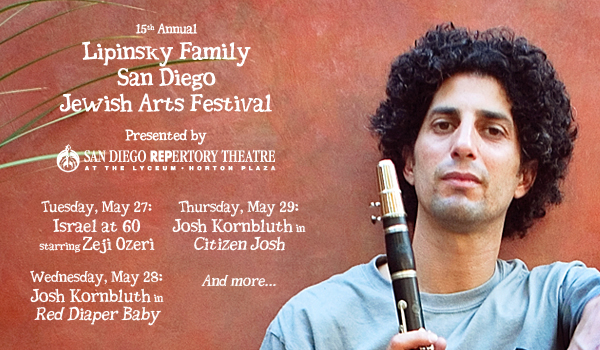
Wednesday, May 28 JFS~Ellen Saks lecture on mental illness
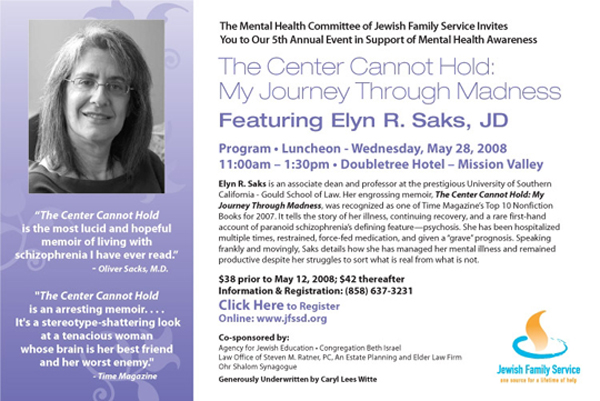

Tuesday, June 3 Guardians Golf & Tennis Tournament


Thursday, June 5 Tifereth Israel's 'Girls Night Out'


Friday-Saturday, June 6-7 JFS~Judaism on the Wild Side


Sunday, June 8 Temple Solel~Tikkun Leil Shavuot
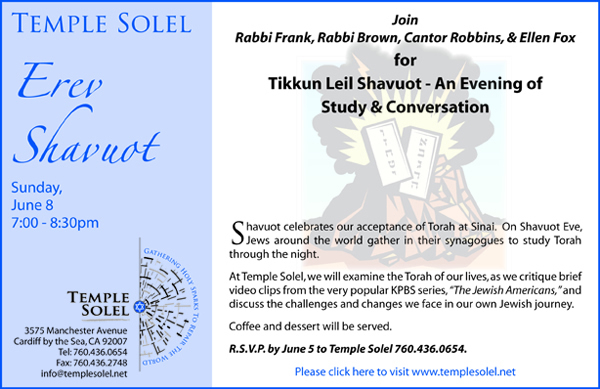

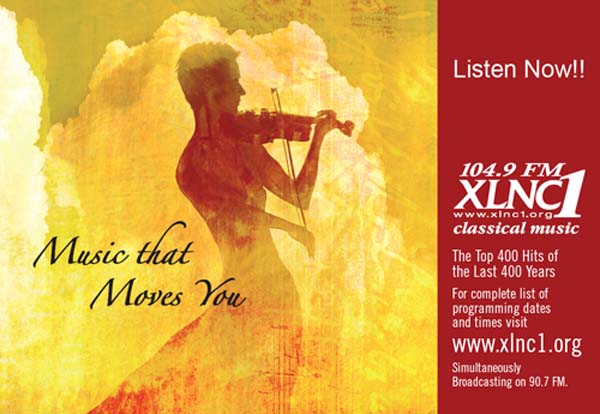

THE JEWISH CITIZEN
Rev. John Hagee and the American Jewish problem with Christian fundamentalists
By Donald H. Harrison
 SAN DIEGO—U.S. Sen. John McCain’s recent repudiation of the endorsement for his presidential candidacy by Rev. John Hagee because of Hagee’s remarks about Catholics and about the Holocaust brings to mind an incident that occurred several years ago in San Diego. SAN DIEGO—U.S. Sen. John McCain’s recent repudiation of the endorsement for his presidential candidacy by Rev. John Hagee because of Hagee’s remarks about Catholics and about the Holocaust brings to mind an incident that occurred several years ago in San Diego.
Most of the organized Jewish community boycotted a dinner for Israel featuring then Jerusalem Mayor Ehud Olmert because of fears that the real agenda of Olmert’s host Pastor Leo Giovinetti of the Mission Valley Christian Fellowship was to attempt to convert Jews.
 There was a lot of agonizing in the Jewish community over boycotting the dinner from which proceeds were to be earmarked for Israeli causes—both because American Jews normally want to support Israel and because it was realized that the boycott might give offense to Olmert, then a rising star in the Israeli political constellation. There was a lot of agonizing in the Jewish community over boycotting the dinner from which proceeds were to be earmarked for Israeli causes—both because American Jews normally want to support Israel and because it was realized that the boycott might give offense to Olmert, then a rising star in the Israeli political constellation.
There was some hand-wringing in San Diego circles after Olmert became the prime minister of Israel. Clearly, he would not remember San Diego Jewry’s boycott of his dinner kindly.
But weighing heavier than such concerns was the conviction in the Jewish community that Christians who say they are friends of Israel—but who disrespect the religion of the Jews—are, at best, temporary allies, not true friends. And those who say that Jews are "lost" unless they accept the divinity of Jesus essentially disrespect us.
Hagee is the leader of Christians United for Israel, but press reports have quoted the pastor as saying that the Holocaust was part of God’s plan to eventually move the Jews to Israel, so that they would be there, as Christian prophecy predicts, to attend the Second Coming of the Messiah.
Some, though not all, Jews find the idea offensive that God was the engineer of the Holocaust, and that the Nazis acted as God’s agents—all for some hidden theological purpose. Among religious believers there is a great divide between those who believe, as Hagee does, that God’s hand is in everything, and those who believe, as many people who contemplate the presence of evil in the world suggest, that God withdrew His/Her powers from human affairs in order to allow humanity to exercise free will.
Those who believe in free will think of Hitler and his followers as evil aberrations, illustrating the darker possibilities of human choices. McCain, most of the world, and I fall within that camp.
In addition to Hagee’s comments about the Holocaust, he has stirred up wrath with anti-Catholic comments with which McCain, quite understandably and appropriately, does not wish to be associated with, nor, I’m certain, do most Jews. Among such Hagee statements were that the Catholic church plunged the world into the dark ages, and that Hitler learned his anti-Semitism as a boy while attending Catholic schools.
American Jews and Israelis tend to view Hagee differently. Israelis see in him a friend with some “strange” ideas about the afterlife. Preoccupied as they are with maintaining their current lives in Israel in the face of Arab hostility, Israelis are willing to take their friends where they can get them. American Jews, on the other hand, see Hagee attempting to utilize his support for Israel to leverage a Christian fundamentalist agenda in the United States. The quid pro quo goes something like this: we have their support on Israel, so we should support them in their quest to institute prayer in the schools, to ban abortion, to oppose equal rights for gays, to permit government subsidies to religious institutions, and so forth.
Would such a country make Jews uncomfortable in America? Would some be tempted to move to Israel? All the better! Christian prophecy forecasts us all going there anyway.
The domestic concerns of American Jews are not those of Israelis, who have their own religious theocrats to deal with in the form of the Orthodox establishment. When rockets are falling on them, it’s small wonder that they are grateful for assistance, whatever the motivation.
I am reminded of a time I traveled in Japan where I interviewed the leader of a Christian sect that prays for the safety of Israel, and which teaches its members Hebrew. It even has a choir that performs Hebrew songs all over the world.
The leader said he believes that Jews and Christians together should pray for the coming of the Messiah.
He smiled when I asked whether we should pray for the Messiah to come the first or the second time. Suppose my house were on fire, he responded. Would I care if the fire engine that responded was painted red or white? Of course not, I responded. Well, said he, let’s pray for the Messiah and when he comes, let him say if he has been here before. He'll settle the issue, but in the meantime let's work together.


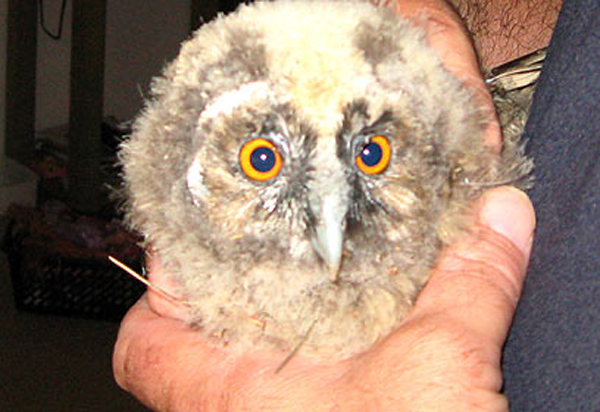
FROM THE GATES OF THE NEGEV
A baby owl gladdens Kibbutz Kfar Aza
By Ulla Hadar
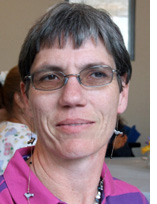 KIBBUTZ RUHAMA, Israel—A very popular song in Israel by Arik Einstein and Miki Gabrielov is called "Fly Little Chick." KIBBUTZ RUHAMA, Israel—A very popular song in Israel by Arik Einstein and Miki Gabrielov is called "Fly Little Chick."
Fly little bird,
Go up in the skies and fly through them
Fly wherever you desire
But don’t forget
My little chick
To be aware
Of the eagles up above
We Israelis like the Hebrew language version of this song very much. It symbolizes the enlisting of our children to the army or when they leave home to start on their own.
I could not help thinking of this song when I heard about the owl chick in Kibbutz Kfar Aza, a sister community of our kibbutz also located in the Sha'ar Hanegev region.
I felt a strong urge to write because there is something so very basic, loving and human in this story.
It is a story about surviving, continuation and caring for each of God's creatures. It is a string of hope to cling onto in moments of sorrow, mourning and despair.
One of the mortar attacks on Kibbutz Kfar Aza was very close to the house of the Robinson family. Four pine trees grow close to the house. As a result of the attack the trees were damaged. The trees actually had shielded the house from the attack. In the incident the nest of an owl family situated in one of the trees was destroyed killing two mature birds.
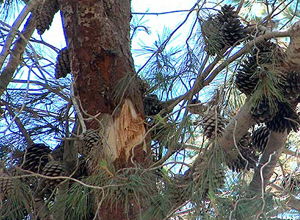 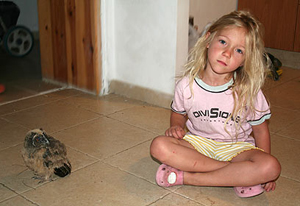
The owls have lived in this tree for years and the birds over time became accustomedto their human neighbors. The Robinson family feared all the birds in the nest had been killed.
However, that night loud bird noises could be heard from the top of the tree. The heartbreaking squeaks of chicks were loud and clear and could be heard all over the neighborhood keeping most of the residents awake. It was clear to every one that there were inhabitants left in one of the badly damaged trees.
The residents of Kfar Aza tried to think of a way to get the chicks down from the tree and to help the unfortunate birds left with no one to care for them. The trees were too high to climb up. Without knowing exactly where the nest was located the rescuing task was quite impossible. In the night the squeaks got weaker and thinner.Apparently the many crows had killed one of the chicks.
It was clear to everyone that they had to move fast to save the one left in the nest.
The National Nature Society was contacted but excessive workload and insufficient manpower did not enable them to handle the situation on the spot. Another two days went by and it is difficult to grasp how the young bird remaining in the tree was still alive, after four days without food and water.
Martin Robinson, the father of the family, got up Monday morning. Glancing from the window of his house, he noticed a big group of crows diving over and over again at the ground. He rushed out of the house and realized that the chick was lying there under attack by a large number of black crows.
Robinson's wife saw him return to the house holding and protecting something in his hands. Only when he reached her did she notice the frightened little bird.
The babu owl sent a sparkle of life through the sorrow and sadness that had engulfed the kibbutz since the death May 9 of their friend Jimmy Kaddoshim who was killed by a mortar attack on Kibbutz Kfar Aza from Gaza.
The bird was immediately "taken in" by the Robinsons. Martin Robinson said that "this little bird was so tiny, fragile but amazing at the same time."
The advice to the family from the National Nature Service, until they arrives, was to refrain from feeding it and to try to put it in a box. Robinson reported. However, "the bird had a mind of its own, no way he was going to enter the box.
"
The owl chick stood up straight and permitted only my young daughter Nomi to touch him.
When the nature guards came to fetch the bird and bring it to the veterinary no eye was dry, everyone had a difficult time to part with this amazing creature."
The little owl was brought to the clinic of veterinarian Dina Lior in Ashkelon. Lior treats many birds like the owl every year and currently she cares for a large number of them at her clinic. The owl was paired with birds of its species and when ready will be set free into nature.
Lior commented: "It was lucky the chick was not hurt and still is so young. This way chances for survival are much bigger. Hopefully the bird will make it safely back to nature."
In Kfar Aza. the Robinson family hopes that the owl will return and build a nest and start a family next to their house.

REFLECTIONS
'Another' finds and civilizes lonely man
By Sheila Orysiek
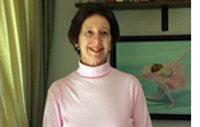 SAN DIEGO—He had everything; food, water and a tent for shelter. His bow was strong, his arrow flew straight and his herds increased. He wandered the land in search of good pasture and found that despite having all he needed, his endless search revealed to him that he needed more. He needed meaning; without which he had nothing. He needed grace, he needed beauty, and he needed “another” in his life. He didn’t need another who was like him, but another who completed him. SAN DIEGO—He had everything; food, water and a tent for shelter. His bow was strong, his arrow flew straight and his herds increased. He wandered the land in search of good pasture and found that despite having all he needed, his endless search revealed to him that he needed more. He needed meaning; without which he had nothing. He needed grace, he needed beauty, and he needed “another” in his life. He didn’t need another who was like him, but another who completed him.
He sought the other out. He tried making pictures and statues; he tried to see the other in things: mountains, flashes of lightning, animals, clouds. Sometimes he thought he had succeeded in finding the other, but each time learned that he was bowing to an empty image - an empty vessel. And then one day he heard a voice; a voice like his but different. A voice of a bride inviting him to seek her out.
The voice reassured him that though different it was what he sought. She had been watching him, measuring him, and found him good - but incomplete. She bade him to approach and also to follow. She both sent him and led him.
She demanded things of him. She wanted not only his heart, but his mind. Not only his first born lamb, but his devotion. She wanted him to change his way of life; to think before he raised his bow against another being. She wanted him to treat others with care; she wanted him to be clean - to curb his appetites. She didn’t want him to simply live, but to be civil.
“Being” was not enough, she said. If he would listen to her, if he would know her, he had to do more than eat, drink, sleep, be. She instructed him how to build her tent but wouldn’t occupy it unless he was worthy. In return she would help him. She would make his house a home. She would participate in helping him multiply. She would give him a reason for each day. If he would bring the fuel she would give him light. If he lit the fire, she would give him warmth.
She set up a code of behavior and invited him to study it and live by it. She challenged him to respond to those around him not with violence but with justice. She became his partner and he soon realized that his life had been filled with things but empty of meaning before she entered it. He must not simply eat, but be thankful for what he ate. He must not merely awaken in the morning, but acknowledge the miracle of the new day.
She brought a dowry but he also paid a bride price. They needed one another. They invested in one another. The partnership was not always smooth. Sometimes they lost sight of one another; occasionally there was anger. They tested one another. Sometimes they needed to separate in order to realize how much each lacked without the other.
But in the end it was a marriage of choice. She proposed her code and he accepted. He proposed she accompany him and she accepted. She could procreate without him - but didn’t want to. He could satisfy himself without her, but it gave him an empty inner world. When they combined their efforts the future became visible; their children gathered around the table.
As he contended with the world around him, he knew she was waiting for him at home. When he hurt her, she forgave him. When he strayed, she welcomed him back. Her forgiveness was always available, but not without price. She demanded that he look inside himself, see where he had erred and strive to do better. But she never denied herself to him. When he said he would do better she believed him.
When others questioned her virtue, he validated it. When some denied her existence, he affirmed it. When others tried to change her name or multiply her identity, he defended both her name and her identity. Though he didn’t ever entirely fathom her essence, he was willing to die to defend his belief in her. He never actually spoke her name, but she answered nevertheless. He treasured the mystery of her.
In times of great stress and danger, it was the thought of her that gave him strength. He carried her within himself - that she waited for him - was always with him - the shelter of her tent was within reach. Once he had known her - once she became part of his life - he found he couldn’t live without her because though he was alive, it was only existence. But, she needed him too - to see what she had created - to love her. Did her beauty exist without him? Was he the mirror? Did their dual reflections increase the beauty of each?
The metaphor of Israel as the Bride and G-D as the Groom - is this juxtaposition of identity assumed because men scribed the Torah? Might it not be the opposite? Might not G-D be the Bride and Israel the Groom?
The Land and the Sea
“Let the water under the sky be gathered to one place, and let dry ground appear." Genesis 1:9
 Separated on the third day Separated on the third day
From the sea the land was born
The birthing still continues
It was evening, and it was morn
The beach is supine, submissive
Responding only to wind and sea
It lays awaiting waves and tide
Without which it would not be
Pounding out a message
Tearing at the placid rock
The sea sifts it down to sand
An eternally corrosive clock
Repelling not its invader
Appearing to bear it passively
While the land is shaped by the ocean
It also lends scape to the sea
Melding to one another
In froth and spume and spray
The onrushing ocean above
The beach shuddering as it lay
While the sea is all sound and fury
The beach pensive, absorbed and mute
Yet it extends a tender welcome
To the oncoming lover’s suit
The sea mood changes every hour
The beach is not frightened of its face
It welcomes the sea’s onslaught
As it comes home to the land’s embrace
In tidal passion the sea advances
Covering the beach as if to smother
But then sated the sea recedes
And each has transformed the other
Spending its ire in a tempest
Forcing a message it insists be learned
Though the sea is a conquering lover
It is to the beach it has returned
When first coming upon the slope
Cresting in foaming raging roar
Then ever more gently rolling
It dissipates upon the shore
And sometimes smiling at the land
In sunshine or gentle shower
But the beach is not ever fooled
It is thrilled by the ocean’s power
And so together they fulfill
In a way both earthly and divine
In a rapturous embrace
The Creator’s glorious design.
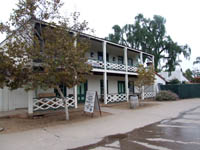
Robinson-Rose House
|
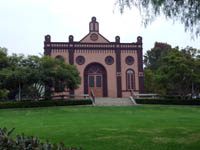
Old Temple Beth Israel |
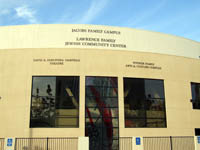
Lawrence Family JCC |
Editor's Note: We are reprinting news articles that appeared in back issues of various San Diego Jewish newspapers. You may access an index of the headlines of those articles by clicking here. You may also use the Google search program on our home page or on the headline index page to search for keywords or names.
Jacob Weinberger Wins New Post
From San Diego Jewish Press, April 24, 1940, page 1
Jacob Weinberger, president of the United Jewish Fund of San Diego and member of the San Diego Board of Education received new honors at the annual meeting of the Jewish Committee for Personal Service in Fresno last week.
Mr. Weinberger was elected a vice president of that organization along with Rabbi Edgar A. Magnin, Los Angeles, and Alfred F. Meyer, San Francisco. Rabbi Rudolph I. Coffee of San Francisco will serve as president, Dr. H.M. Ginsburg, Fresno, secretary, Lloyd Dinkelspiel, San Francisco, treasurer.
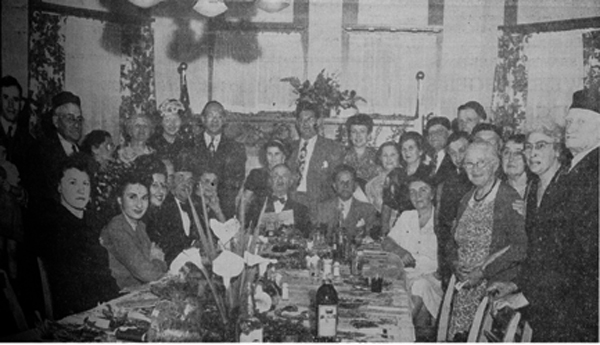
Hebrew Home Seder
From the Southwestern Jewish Press, April 18, 1946, page 1
Shown in photo is the first night seder held at the Hebrew Home for the Aged Monday Evening (April 15), with Rabbi Moise Bergman conducting the ritual, assisted by Joe Dembo. Concluding the traditional meal, the residents of the home and their guests joined in the galaxy of Jewish folk songs.
Established a year ago, the Home is the culmination of years of planning on the part of a small group of men and women. Through the warm support of the San Diego Jewish community, our old folks celebrate Pesach in the security of a home of their own this year. (Photo by D. Miller)
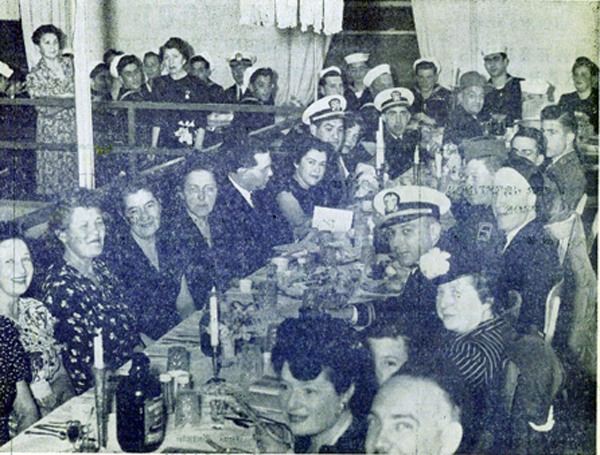
Tifereth Israel Seder
From the Southwestern Jewish Press, April 18, 1946, page 1
Photo shows the first night Passover seder at the Congregation Tifereth Israel. Sponsored by the Jewish Welfare Board and the United Jewish Fund, the seder meal was prepared and served by the Daughters of israel to 175 servicemen. Rabbi Epriam Siegel and Chaplain Samuel Sobel lead the ceremonies. The second night seder at the Shule was attended by 150 servicemen.
This is the sixth year that the community has played host to service personnel in this area at the Passover holiday. (Photo by D. Miller)
{Return to top}

Nancy Harrison
cruise & tour specialist
(619) 265-0808

SAN DIEGO JEWISH WORLD THE WEEK IN REVIEW
Carol Davis in Ottawa, Canada: A Jewish rendezvous in Canada
Ulla Hadar in Kibbutz Ruhama, Israel: Israeli mayors neighboring Gaza demand Israel's goverment stop the terrorist rockets
Sheila Orysiek in San Diego: Chapter Nine in the serialization of her novel, Reluctant Martyr
Ira Sharkansky in Jerusalem: Are peace talks Olmert's diversion?
Howard Wayne in San Diego: Farewell to two dear friends: Lionel Van Deerlin and Mike Gotch
Adventures in San Diego Jewish History: What was the Jewish community news in 1950? Who were the newsmakers? Our archives answer these questions in daily installments
Donald H. Harrison in San Diego: Reelect San Diego Mayor Jerry Sanders
Eran Lerman in Jerusalem: 'Peres' Planet': Electric cars, Arab-Israeli cooperation, new cities in the Arava
Hal Wingard in San Diego: His songs "Adira Hee," "Lech L'cha," and "Mitzvah Soup"
Adventures in San Diego Jewish History: What was the Jewish community news in 1950? Who were the newsmakers? Our archives answer these questions in daily installments
Donald H. Harrison in San Diego: Protecting America's 'House of Pluralism'
Evelyn Kooperman in San Diego: San Diego Jewish Trivia: Balboa Park
Adventures in San Diego Jewish History: What was the Jewish community news in 1950? Who were the newsmakers? Our archives answer these questions in daily installments
Link to previous editions
< BACK TO TOP
|
